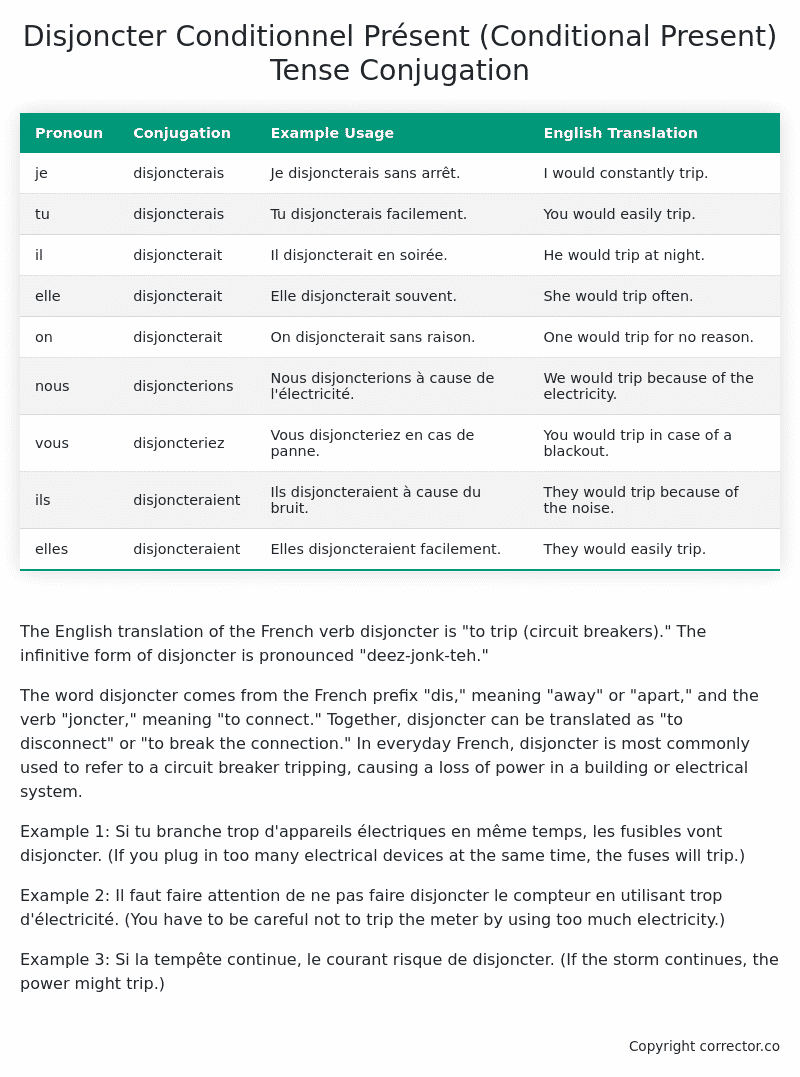Conditionnel Présent (Conditional Present) Tense Conjugation of the French Verb disjoncter
Introduction to the verb disjoncter
The English translation of the French verb disjoncter is “to trip (circuit breakers).” The infinitive form of disjoncter is pronounced “deez-jonk-teh.”
The word disjoncter comes from the French prefix “dis,” meaning “away” or “apart,” and the verb “joncter,” meaning “to connect.” Together, disjoncter can be translated as “to disconnect” or “to break the connection.” In everyday French, disjoncter is most commonly used to refer to a circuit breaker tripping, causing a loss of power in a building or electrical system.
Example 1: Si tu branche trop d’appareils électriques en même temps, les fusibles vont disjoncter. (If you plug in too many electrical devices at the same time, the fuses will trip.)
Example 2: Il faut faire attention de ne pas faire disjoncter le compteur en utilisant trop d’électricité. (You have to be careful not to trip the meter by using too much electricity.)
Example 3: Si la tempête continue, le courant risque de disjoncter. (If the storm continues, the power might trip.)
Table of the Conditionnel Présent (Conditional Present) Tense Conjugation of disjoncter
| Pronoun | Conjugation | Example Usage | English Translation |
|---|---|---|---|
| je | disjoncterais | Je disjoncterais sans arrêt. | I would constantly trip. |
| tu | disjoncterais | Tu disjoncterais facilement. | You would easily trip. |
| il | disjoncterait | Il disjoncterait en soirée. | He would trip at night. |
| elle | disjoncterait | Elle disjoncterait souvent. | She would trip often. |
| on | disjoncterait | On disjoncterait sans raison. | One would trip for no reason. |
| nous | disjoncterions | Nous disjoncterions à cause de l’électricité. | We would trip because of the electricity. |
| vous | disjoncteriez | Vous disjoncteriez en cas de panne. | You would trip in case of a blackout. |
| ils | disjoncteraient | Ils disjoncteraient à cause du bruit. | They would trip because of the noise. |
| elles | disjoncteraient | Elles disjoncteraient facilement. | They would easily trip. |
Other Conjugations for Disjoncter.
Le Present (Present Tense) Conjugation of the French Verb disjoncter
Imparfait (Imperfect) Tense Conjugation of the French Verb disjoncter
Passé Simple (Simple Past) Tense Conjugation of the French Verb disjoncter
Passé Composé (Present Perfect) Tense Conjugation of the French Verb disjoncter
Futur Simple (Simple Future) Tense Conjugation of the French Verb disjoncter
Futur Proche (Near Future) Tense Conjugation of the French Verb disjoncter
Plus-que-parfait (Pluperfect) Tense Conjugation of the French Verb disjoncter
Passé Antérieur (Past Anterior) Tense Conjugation of the French Verb disjoncter
Futur Antérieur (Future Anterior) Tense Conjugation of the French Verb disjoncter
Subjonctif Présent (Subjunctive Present) Tense Conjugation of the French Verb disjoncter
Subjonctif Passé (Subjunctive Past) Tense Conjugation of the French Verb disjoncter
Subjonctif Imparfait (Subjunctive Imperfect) Tense Conjugation of the French Verb disjoncter
Subjonctif Plus-que-parfait (Subjunctive Pluperfect) Tense Conjugation of the French Verb disjoncter
Conditionnel Présent (Conditional Present) Tense Conjugation of the French Verb disjoncter (this article)
Conditionnel Passé (Conditional Past) Tense Conjugation of the French Verb disjoncter
L’impératif Présent (Imperative Present) Tense Conjugation of the French Verb disjoncter
L’infinitif Présent (Infinitive Present) Tense Conjugation of the French Verb disjoncter
Struggling with French verbs or the language in general? Why not use our free French Grammar Checker – no registration required!
Get a FREE Download Study Sheet of this Conjugation 🔥
Simply right click the image below, click “save image” and get your free reference for the disjoncter Conditionnel Présent tense conjugation!

Disjoncter – About the French Conditionnel Présent (Conditional Present) Tense
Formation
Common Everyday Usage Patterns
Expressing Polite Requests
Expressing Hypothetical Situations
Expressing Doubt or Uncertainty
Interactions with Other Tenses
Present Tense
Past Tense
Future Tense
Conditional Perfect
Summary
Want More?
I hope you enjoyed this article on the verb disjoncter. Still in a learning mood? Check out another TOTALLY random French verb conjugation!


